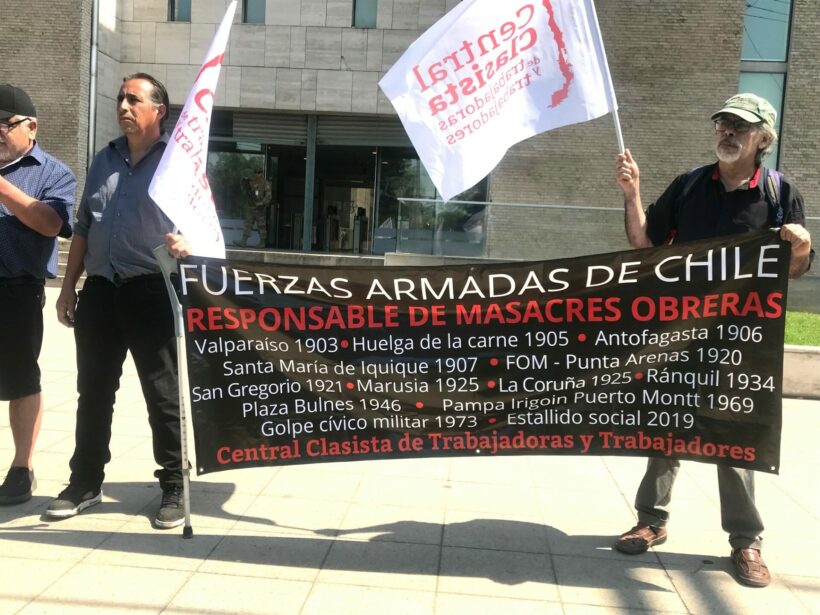“We have pure reasons, we have why to fight”.
Luis Advis
On 21 December 1907, 116 years ago, thousands of striking saltpeter workers and their families were killed by the Chilean army. In the massacre at the Santa María school in Iquique, Chilean, Peruvian, Bolivian, and other workers of different nationalities fell under the blast of the oligarchy and British colonialism.
Seven years after the massacre, the anarchist Antonio Ramón Ramón tried to execute General Silva Renard, who led the massacre in which his brother Manuel Vaca was killed. Ramón Ramón was captured and imprisoned and died a decade later.
During the morning of 21 December 2023, trade union leaders of the Central de Clase, o Clasista de Trabajadores y Trabajadoras (Class, or Classist Worker’s Central) stationed themselves at the gates of the Commander-in-Chief of the Chilean Army, located next to O’Higgins Park in Santiago, to commemorate and condemn the military, the murderous hand of the interests of the wealthy minority in the Andean country, and responsible for the countless mass crimes committed against the working people.
In this regard, the Central South Federation of Retail trade union leader, Santiago Martinez, said, “Throughout our history, the uniformed have behaved as a praetorian guard of the wealthy classes. Thousands of workers have been murdered in workers’ and popular mobilisations. This is in addition to the barbarities committed against the native peoples. Some of them are the Lo Cañas Massacre, Santiago 1891; Meat Meeting, Santiago 1905; Plaza Colón, Antofagasta 1906; Santa María School, Iquique 1907; Forrahue Massacre, Osorno 1912; FOM Headquarters, Punta Arenas 1920; San Gregorio, Antofagasta 1921; Marusia, Antofagasta 1925; La Coruña, Tarapacá 1925; Ranquil, Malleco 1934; Plaza Bulnes, Santiago 1946; José María Caro, Santiago 1962; El Salvador, Diego de Almagro 1966; Puerto Montt 1969; to which must be added the countless massacres during the terrorist dictatorship of Pinochet, and in the social outbreak of 2019”, and added that, “Chile and its workers need a real Armed Forces, patriotic, with honour, clean of murder, robbery and corruption. Only then can we have popular sovereignty.
For his part, the representative of the Workers’ Union of the Café do Brasil Importer, Miguel Méndez, explained that “the important thing is that our rank and file know what has happened throughout our class history. The difficulties come from those leaders who don’t even remember all the blood it has cost us to get here”.
Óscar Jiménez is the director of the inter-company union Sintraces in the telecommunications sector. And while with the corner of his eye, he was never distracted from the mummified military guard at the entrance to the army headquarters, he pointed out that “without justice, there is no peace. We have come to evoke that through the class struggle, we workers are the ones who end up laying the bodies. That is why we want to do politics so that our people know that we also do politics and that politics is not the property of a few”.
The action was accompanied by José Amaro Seguel, one of the people who suffered the amputation of one of his eyes and part of his jaw by military ammunition during the popular uprising on 1 August 2020, in the metropolitan district of Peñalolén, at the intersection of Grecia and Tobalaba streets. His situation became even worse when a year ago, in the vicinity of Plaza Dignidad and amid repression by the military police, he fell several metres to the banks of the Mapocho. As a result, he now has to use crutches to get around.
“The military has neither courage nor glory”, said José Amaro, adding that “they have only dedicated themselves to killing workers and the poor every time we fight for basic improvements and social justice”.
“I feel like a contemporary survivor of the massacre at the Santa María school in Iquique,” said Amaro.
– The no-end song of the cantata created by Luis Advis and dedicated to the Santa María de Iquique school massacre says “Maybe tomorrow or the day after, or in a while, the story you have listened to will happen again. Chile is such a long country, a thousand things can happen if we don’t prepare ourselves resolutely to fight”. And are we prepared?
“That is our problem. Our memory. Our bad memory.”










